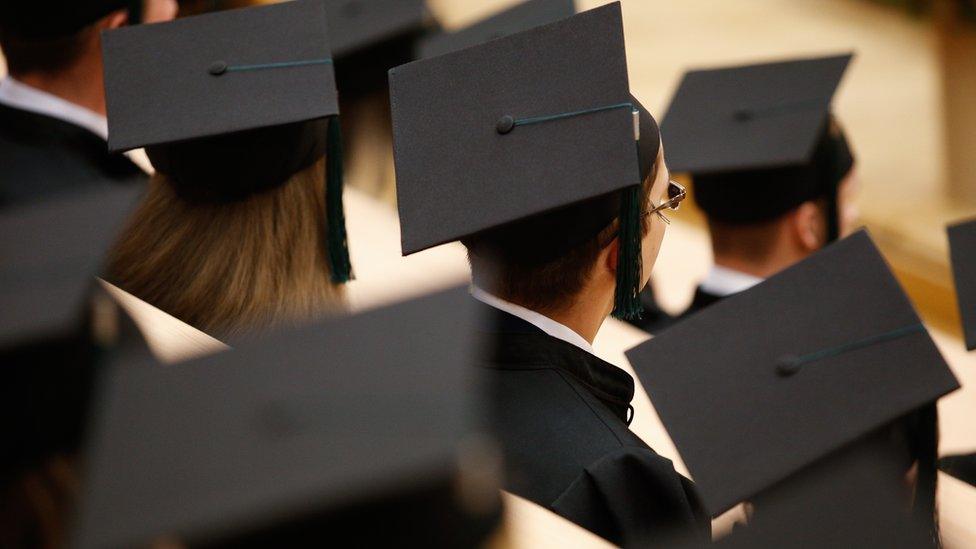Student debt: The teachers told they had taken out the wrong kind of loan
- Published
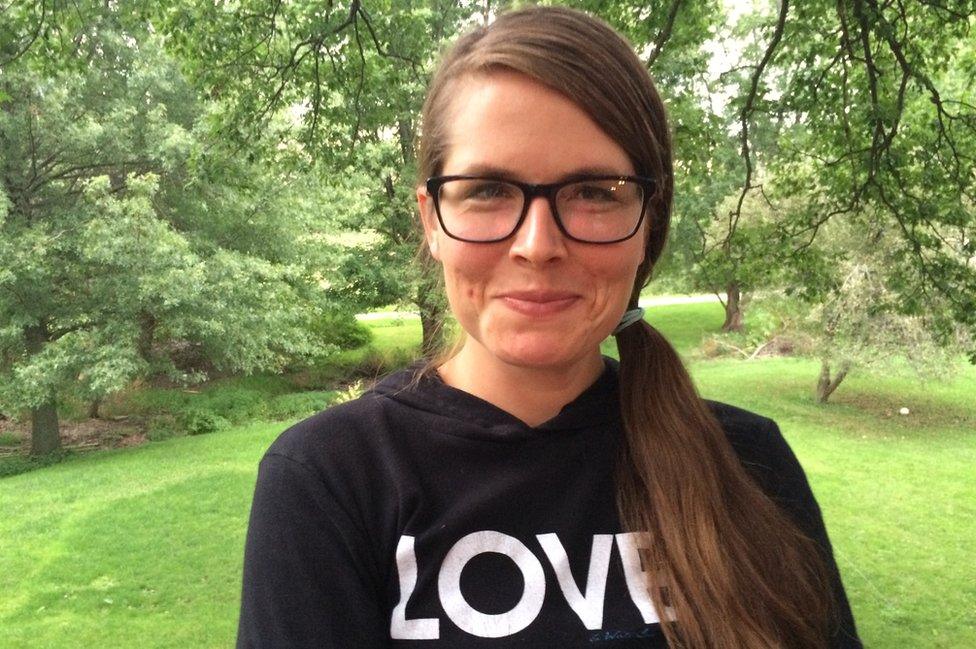

An art teacher who started paying off her student loans more than a decade ago still owes about $88,000 (£71,000) - despite being promised the loan would have been written off by now. How has that happened?
Kelly Finlaw has a little speech that she recites at the start of each academic year to her students at the New York middle school where she teaches. It might get repetitive for the students in the seventh and eighth grades, but she does it anyway. It's important to her.
"I'm not an art teacher because I want to teach you about art," she tells them. "I teach because I care about YOU and I want you to be more confident, more expressive and more of your true selves after the year is over.
"I teach art because I love you as people and art gives me an avenue to invest in who you are."
She's also the kind of teacher who puts together a video slideshow of her pupils to congratulate them as they leave the public school. The kind whose pupils get sad when they graduate or head off on spring break. The kind who spends her own money on art supplies for the classroom.
'There's no paying it off'
But Ms Finlaw, 36, is also the kind of teacher who feels that she's not received that same investment from the government as she puts into her students.
The kind of teacher who was told that she was eligible for student loan forgiveness - that is, having the outstanding balance paid off - after making payments for 10 years, only to be told she had the wrong kind of loan. And that actually, she had another decade ahead of her of making monthly repayments of hundreds of dollars a time.
She thinks she originally started with $100,000 of debt, but hasn't been able to get hold of her own records.
"I'm going to die with this debt," she says. "There's no paying it off."
She is one of eight people named in a joint lawsuit against the Department of Education and Education Secretary Betsy DeVos, external over what they say is the mismanagement of the Public Service Loan Forgiveness (PSLF), external programme.

Student debt in figures
America's outstanding student loan balance, as of 31 December 2018, totals $1.4tn
The Department of Education says approximately 13 million people receive more than $120bn each year in federal student loans, grants and work-study funds
According to a Harvard University study, external, 42% of 18 to 29-year-olds have student loan debt
70% say financial circumstances played a role in their decision on whether or not to go to college, according to the study

It was introduced in 2007, intended to encourage people to take up careers in public service - relieving the burden of student debt for those like nurses, teachers and police officers.
To qualify, you have to work full-time and make 120 monthly payments. Then, the theory is, the rest of your loan will be "forgiven", that is, paid off. But only a small percentage of people applying, after the 10 years have passed, have had their loans repaid - something the lawsuit is seeking to rectify.
According to the department's most recent report, external, 73,554 borrowers have applied for loan forgiveness since October 2017 - the first date people could apply - and the total number of applications is 86,006. Of those, 864 applications have been approved, with a total of 518 having their loan discharges processed. So far, 75,138 applications have been rejected, the most common reasons being over making qualifying payments, missing information and there being no eligible loans.
For its part, the Department of Education is saying that it is committed to the scheme. It also introduced an online help tool, external last year for borrowers wanting more information on PSLF.
Liz Hill, press secretary at the Department of Education, said: "The department doesn't comment on pending litigation, but I would point out, that the department is faithfully administering the complex programme Congress passed."
'Wrong type of loan'
Ms Finlaw, who grew up in Ohio and studied in Indiana and Philadelphia, started teaching before PSLF was introduced. Having taken out loans to cover her education, when she was told she was eligible, she joined the scheme.
"But after 10 years, the federal loans company told me 'your loan's not forgiven, one of your loans did not qualify'. I said 'what's the deal?' - and they told me it wasn't the right type."
That meant, she was told, she had another 120 payments to make. Another 10 years until the weight of debt was taken off her shoulders.
Ms Finlaw sounds more resigned than bitter as she says: "I had a lot of hope it was the light at the end of the tunnel for my payments. I really thought my financial situation was going to be altered. And then I get the letter back. I almost wasn't surprised. But I felt duped. Like I should have known better."
Only direct loans, issued by the Department of Education, qualify under the programme - rather than commercial loans guaranteed by the federal government. But Ms Finlaw says she wasn't told she had the wrong kind of loan for years.
She feels that it's "demoralising as a teacher to give your life to it, and not be recognised as a vital component" of society. Often people think it's easy being a teacher, she muses - they just see the hours and the days off.
"The loan not being paid off is totally linked to this attitude. There's no respect for what we do, there's no validation that our work matters," she adds.
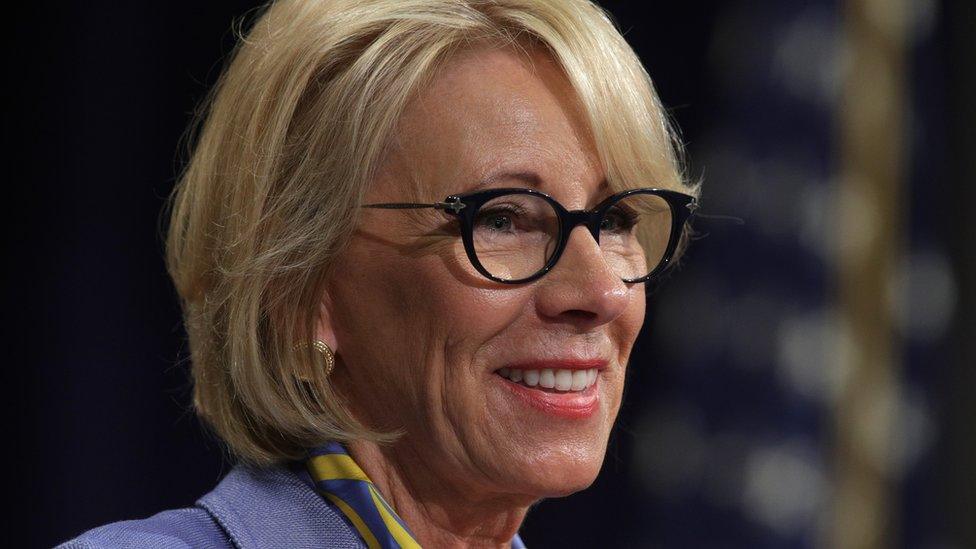
Education Secretary Betsy DeVos is being sued alongside the Department of Education
"I love my school," she says. "But we don't have a gym or an auditorium. I buy my own art supplies. We're giving kids the very best education we possibly can and our kids love the school.
"You do that for 10 years. You pay loans that are crippling you financially and then at the end, someone says 'whoops, sorry - you have 10 more years'."
Lena Konanova, representing the teachers, says there was a lack of clear process from the government. She says the department and secretary have "grossly mismanaged this public service loan forgiveness programme" and that "this violates the law".
Ms Konanova says those applying do not know what the denial has been based on so they're not able to rebut it, adding: "They've been told a decade later that they've had the wrong type of loan."
She says the next step is for the Department of Education and Ms DeVos to answer the complaint - they have 60 days to do so.
'Unrealistic'
While she feels winning the court case would be justice for her, ultimately Ms Finlaw wants accountability, dignity for teachers and "a programme that follows through with its promises".
"I want people to be able to get their loans paid back without having to go through a lawsuit," she adds.
Ms Finlaw recently looked into buying her own apartment, as she is currently renting.
"I wanted to invest in something I could have for myself, something I could make money on down the road," she says. "But I contacted a real estate agent and he said: 'There's nothing you'll be able to get, it's unrealistic."
Despite this, she will be back at the school she loves in September, with the supplies she has bought with her own money. During the year, they will learn about Salvador Dali and Keith Haring, perspective and pointillism. In December, just before Christmas, the entire school will make gingerbread houses.
But she will start the year by telling her students, new and old, as she always does: "I'm not an art teacher because I want to teach you about art..."
- Published24 June 2019
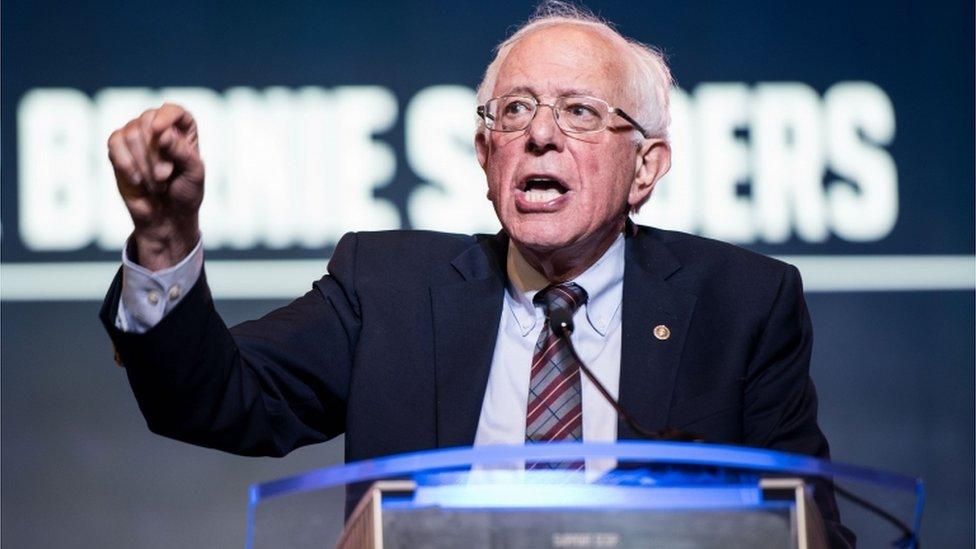
- Published12 September 2018
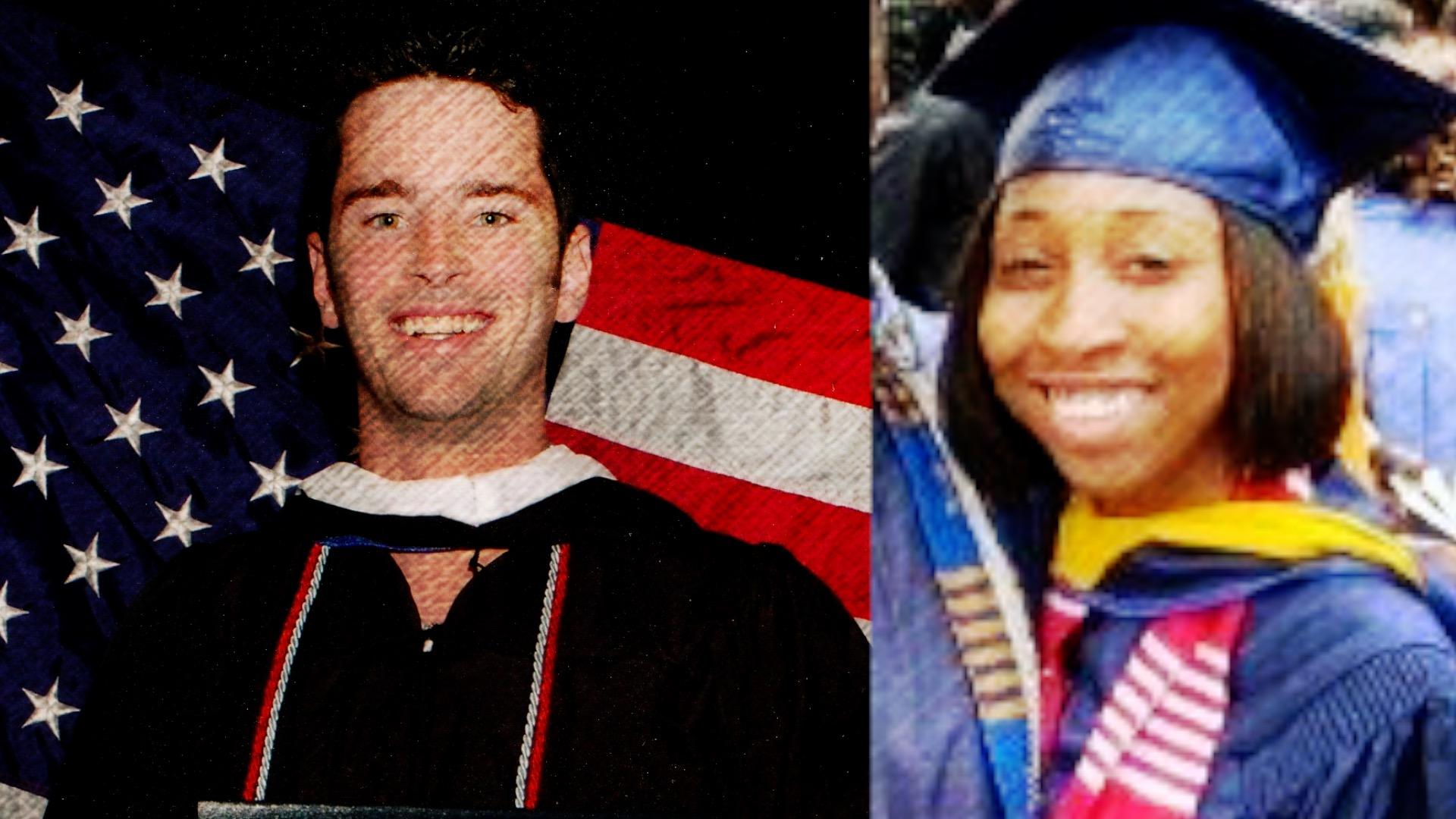
- Published27 August 2018
